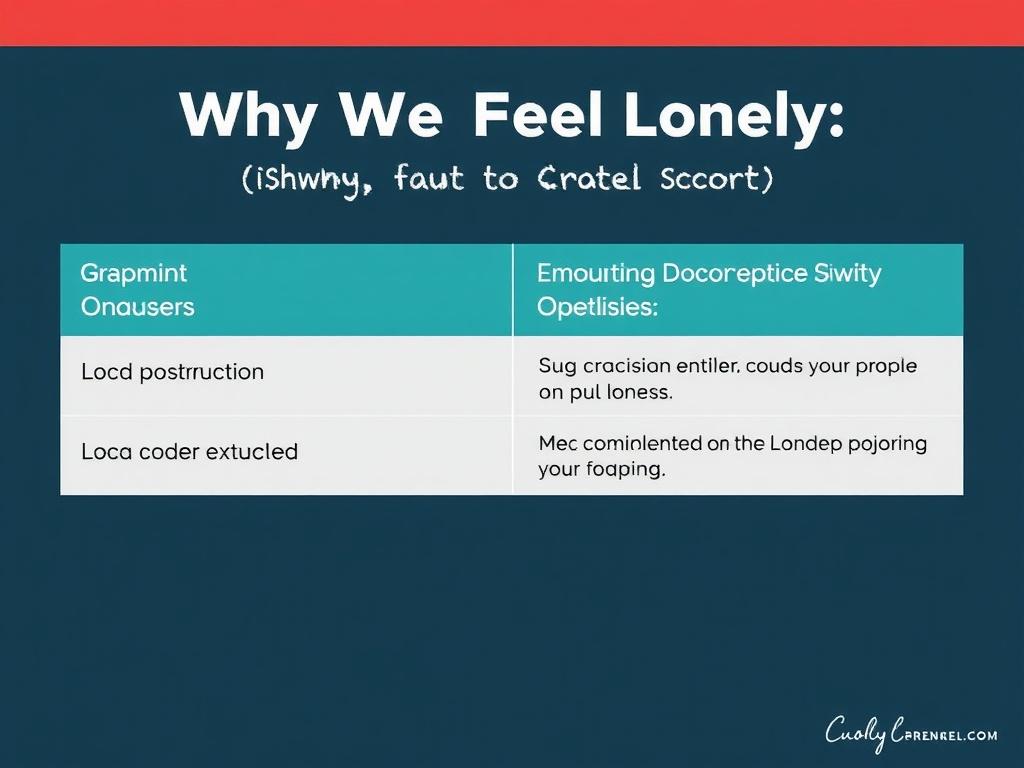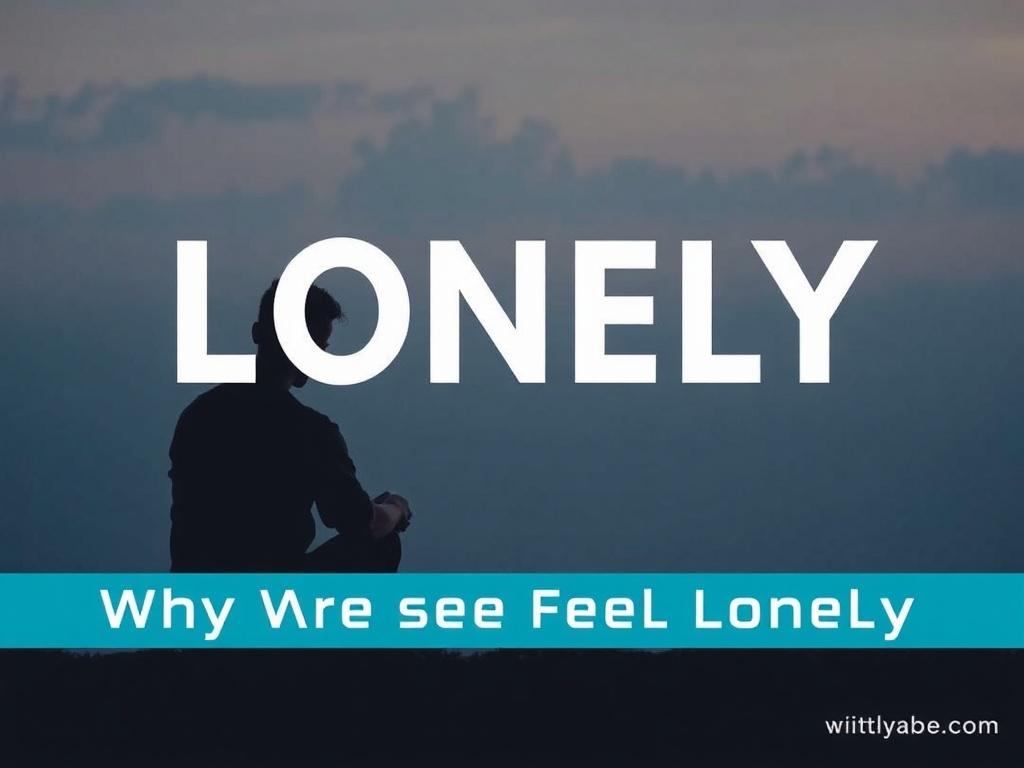Loneliness is a feeling that almost everyone experiences at some point in their lives. Whether it’s a brief sense of separation or a deeper, ongoing emotional ache, feeling lonely can affect our health, happiness, and overall well-being. But why do we feel lonely in the first place? And more importantly, how can we cope with it effectively? In this article, we will explore the science behind loneliness, the common causes, its effects on our mind and body, and practical ways to overcome these difficult emotions. By understanding loneliness better, we can learn to manage it and even use it as a stepping stone for personal growth.
What Is Loneliness and Why Do We Feel It?
Loneliness is not just about being physically alone; it’s a complex emotional state where a person feels isolated, disconnected, or misunderstood by others. Unlike solitude, which can be a positive and refreshing experience, loneliness is generally uncomfortable and painful. Psychologists describe loneliness as a subjective feeling—some people may be surrounded by friends and family but still feel lonely because their emotional needs aren’t met.
But why do we feel lonely? At its core, loneliness is an evolutionary signal—a reminder that humans are social creatures who require connection with others to survive and thrive. Our ancestors depended on social groups for protection, food, and reproduction. When isolated, feelings of loneliness would push them to rejoin their group, increasing their chances of survival.
Today, the same mechanism persists. When we feel lonely, it alerts us that something in our social life needs attention. Loneliness can be triggered by major changes such as moving to a new city, losing a loved one, or going through a breakup. Even subtler causes like poor quality relationships or feeling misunderstood can generate loneliness.
The Difference Between Loneliness and Being Alone
It’s important to distinguish between loneliness and simply being alone. Being alone means physical solitude—spending time by yourself, which many people enjoy and find necessary for relaxation or self-reflection. Loneliness, however, is the painful feeling that comes from a perceived lack of meaningful social connections.
Many people confuse the two and believe that solitude inevitably leads to loneliness, but this is not the case. Some people feel lonely even in crowded rooms, while others feel peaceful and fulfilled when alone. The quality of relationships and emotional fulfillment matter far more than the number of people around us.
Common Causes of Loneliness
Loneliness can arise from many sources, and understanding these common causes can help us identify the root of our feelings and take steps toward healing.
Life Transitions
Major life changes often increase loneliness. For example, starting college, changing jobs, moving to a new place, or retirement can all disrupt established social networks. When familiar social routines disappear, people may struggle to build new connections, leading to feelings of isolation.
Relationship Issues
Loneliness often stems from the quality of our relationships rather than their quantity. Being in a relationship that lacks emotional closeness or feeling unsupported by friends and family can trigger loneliness. Sometimes, misunderstandings or unresolved conflicts create distance that makes us feel alone even when we aren’t physically distant.
Social Media and Technology
Paradoxically, the rise of social media and smartphones has changed how we interact but doesn’t always reduce loneliness. Excessive use can replace face-to-face interaction with superficial online contacts, creating a sense of disconnection. Comparing ourselves to curated portrayals of others’ lives on social media can also increase feelings of inadequacy and loneliness.
Personality Traits
Some personality types may be more susceptible to loneliness. For example, people who are shy, introverted, or have low self-esteem might find it harder to reach out or maintain social connections. However, loneliness affects people of all personalities.
Health Problems
Physical and mental health issues can contribute to loneliness. Chronic illnesses, disabilities, or conditions like depression and anxiety may limit social interaction or make people feel alienated. In turn, loneliness can worsen health, creating a difficult cycle.
How Loneliness Affects Our Mind and Body
Loneliness is more than an unpleasant feeling; it has real effects on our health. A growing body of research shows the profound impact loneliness can have on both mental and physical well-being.
Mental Health Impacts
One of the most significant effects of loneliness is on mental health. Chronic loneliness is linked to higher risks of depression, anxiety, and low self-esteem. The constant feeling of being disconnected can lead to negative thoughts about oneself and others, deepening emotional pain.
Additionally, loneliness affects cognitive functions. Studies suggest that loneliness can impair concentration, memory, and decision-making. It can also increase stress levels, which negatively impact brain health over time.
Physical Health Consequences
Long-term loneliness takes a toll on the body as well. It has been associated with higher blood pressure, disrupted sleep, and a weakened immune system. Research even suggests that loneliness can increase the risk of cardiovascular disease and premature death.
Scientists believe loneliness triggers a chronic stress response where the body remains in a heightened state of alert. This “fight or flight” mode, while useful in short bursts, becomes harmful when prolonged, leading to inflammation and other health problems.
Practical Strategies to Cope With Loneliness
If you’re feeling lonely, it’s important to know you’re not alone, and there are ways to cope with and reduce loneliness. The following strategies are practical and accessible to most people.
Focus on Quality Over Quantity in Relationships
Rather than trying to accumulate a large number of acquaintances, focus on deepening connections with a few people. Meaningful conversations, shared experiences, and emotional support can significantly reduce loneliness. Try to nurture relationships where you feel seen, heard, and valued.
Reach Out and Build Social Connections
Taking the initiative to reach out can feel challenging, but it’s essential. Join clubs, classes, or groups that align with your interests. Volunteering can also provide a sense of purpose and community. Even small interactions, like chatting with neighbors or coworkers, can build a network over time.
Practice Self-Compassion and Mindfulness
When loneliness feels overwhelming, it’s easy to fall into negative thinking patterns. Practicing self-compassion—treating yourself with kindness and understanding instead of harsh judgment—can help alleviate emotional pain. Mindfulness meditation can also help you stay present and reduce anxiety related to loneliness.
Limit Social Media Use
While social media can be a useful tool to stay connected, it’s important to monitor its impact on your emotions. Limit time spent scrolling, and try to focus more on in-person or meaningful online interactions. Remember that online platforms often present an idealized version of people’s lives.
Engage in Activities That Bring Joy and Purpose
Filling your time with hobbies, exercise, creative projects, or learning new skills can boost mood and build confidence. These activities can also be opportunities to meet others with similar interests, enhancing your social life.
Seek Professional Help if Needed
Sometimes loneliness is linked to underlying mental health issues like depression or anxiety. If your feelings of loneliness are persistent and affect your daily life, consider seeking help from a counselor or therapist. They can provide support and strategies tailored to your situation.
Loneliness and Age: How It Affects Different Generations
Loneliness isn’t limited to any specific age group; it affects children, young adults, middle-aged individuals, and seniors in unique ways.
Young People and Loneliness
Contrary to popular belief, young people are at high risk of loneliness, especially with the rise of social media. Teenagers and young adults often struggle with identity, peer pressure, and major life transitions, leading to social isolation.
Adults Facing Work and Family Stress
Adults balancing careers, family, and social expectations may feel lonely due to lack of time or meaningful connections. The pressure to “have it all” can create feelings of inadequacy and detachment.
Older Adults and Social Isolation
Senior citizens often experience loneliness due to factors like retirement, loss of loved ones, reduced mobility, or health issues. Social isolation in older adults is a serious concern and has been linked to declining health and cognitive abilities.
How Society and Communities Can Help Reduce Loneliness

While loneliness is a personal experience, it’s also a societal issue. Communities and organizations can play a vital role in helping individuals feel connected.
Creating Inclusive Spaces
Public spaces such as parks, community centers, and libraries can serve as welcoming places for social interaction. Events, workshops, and cultural activities can bring people together, fostering a sense of belonging.
Promoting Awareness and Education
Recognizing loneliness as a significant health concern encourages empathy and support. Educational programs can help people understand how to build healthy relationships and seek help when needed.
Encouraging Neighborly Connections
Simple actions like checking on neighbors, organizing block parties, or community potlucks can create strong social bonds. Small local initiatives have powerful effects on reducing isolation.
Table: Common Causes and Coping Strategies for Loneliness

| Common Causes of Loneliness | Practical Coping Strategies |
|---|---|
| Life Transitions (moving, retirement) | Join social groups, volunteer, build new routines |
| Poor Quality Relationships | Focus on deepening meaningful connections |
| Social Media Overuse | Limit time online, prioritize face-to-face interactions |
| Personality Traits (shyness, introversion) | Practice self-compassion, take small social steps |
| Health Problems (chronic illness, depression) | Seek professional support, engage in adaptive activities |
List: Quick Tips to Mitigate Loneliness

- Make a daily effort to connect, even briefly, with others.
- Try journaling your feelings to better understand your loneliness.
- Practice gratitude to focus on positive aspects of your life.
- Explore hobbies that encourage social interaction.
- Reach out for help from a trusted friend or professional if needed.
- Prioritize physical activity to boost mood and energy.
- Set realistic social goals that fit your personality and lifestyle.
Conclusion
Loneliness is a natural, albeit painful, human experience that signals our deep need for connection and belonging. Understanding why we feel lonely, recognizing its causes, and realizing its impact on our mental and physical health are the first steps toward healing. Although loneliness can feel overwhelming at times, it is not permanent. By focusing on building meaningful relationships, practicing self-compassion, engaging in purposeful activities, and seeking support when needed, we can learn to cope with loneliness effectively and transform it into an opportunity for growth and deeper self-awareness. Ultimately, loneliness reminds us of the importance of connection—not just with others, but also with ourselves.




















